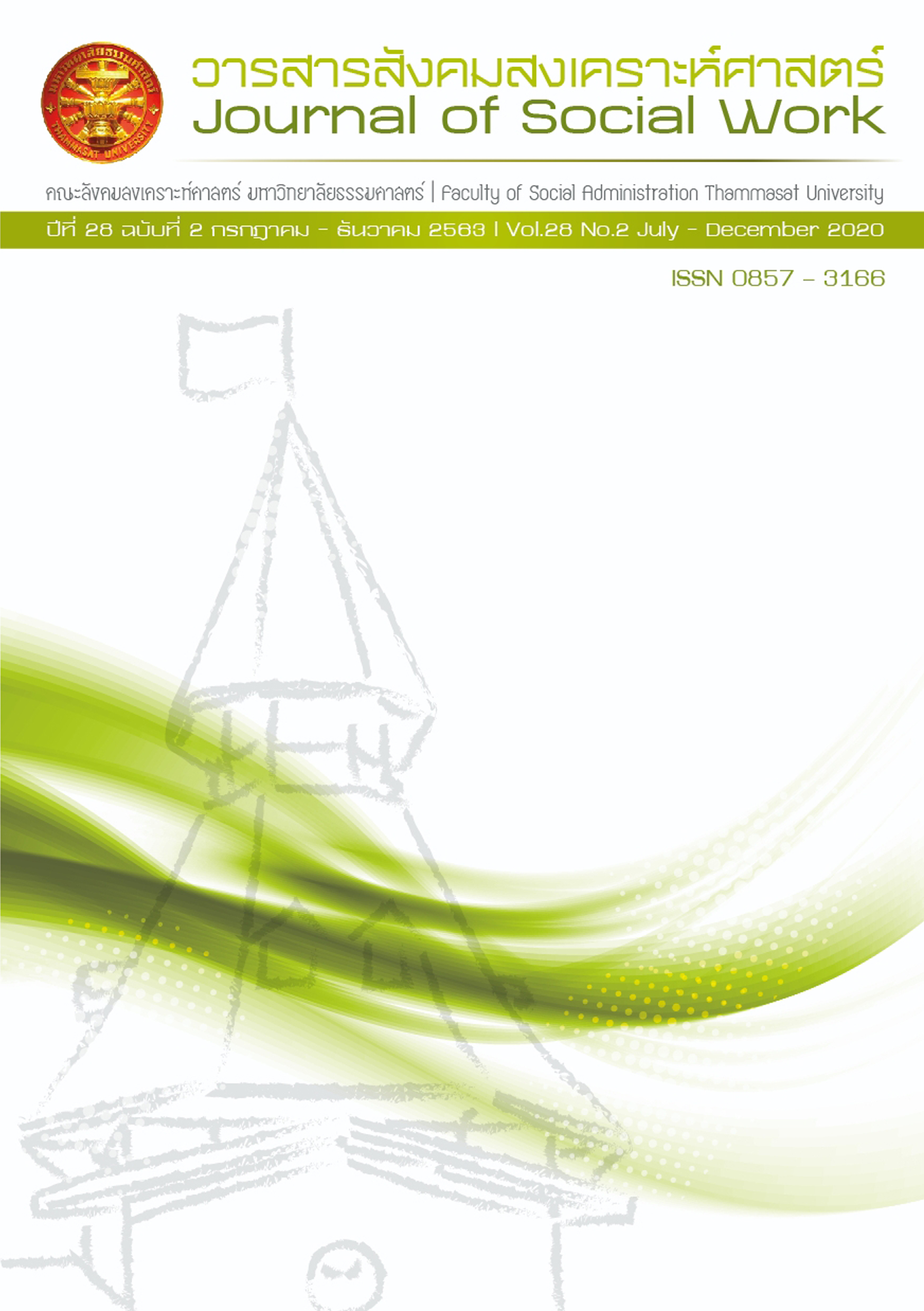Guidelines for the Development of Models and Management in Institutions of Divison of Welfare Protection and Development for Persons with Disabilities
Keywords:
Model, Management in Institutions, Persons with Disabilities.Abstract
The objective is to study and review the pattern of welfare protection for the disabled in suitable institutions in each stage of life. Develop the process of protecting the welfare of the disabled and to provide policy information on the development of a model for the protection of the welfare of the disabled in institutions Research methodology is qualitative research. Tools used in this research are focus groups and in-depth interviews. The results showed that The service model of the institution for the protection and development of the disabled in the institution is "one size fits for all", which is the same form of care everywhere. And there is a form of protection for the welfare of the disabled outside the institution (Deinstitutionalization) is a day-to-day service, a process for protecting the welfare of people with disabilities in appropriate institutions. 1. Service forms for the protection and development of the disabled, which are family-based services, the community-based services (Community-based) and CPR Center (Project for Distress Relief Therapy) in every province 2. Local Administration-based service model 3. Partnership-Based service model 4. Service forms in the institution (Institutional-Based) Suggestions should develop more services outside the institution. Should be a learning institution to take care of the disabled in the family or community There should be tools, measures, processes, and methods that allow disabled families to live. And can take care of people with disabilities at home
References
กรมส่งเสริมและพัฒนาคุณภาพชีวิติคนพิการ กระทรวงการพัฒนาสังคมและ
ความมั่นคงของมนุษย์. (2562). กระบวนการพัฒนาการคุ้มครองและส่งต่อคนพิการในสถาบัน. กรุงเทพฯ: กองคุ้มครองสวัสดิภาพคนพิการ.
กรมส่งเสริมและพัฒนาคุณภาพชีวิตคนพิการ. (2562). รายงานข้อมูลสถานการณ์ด้านคนพิการในสถาบันของกองคุ้มครองสวัสดิภาพและคนพิการ. กระทรวงการพัฒนาสังคมและความมั่นคงของมนุษย์, กองคุ้มครองสวัสดิภาพและคนพิการ.
กระทรวงการพัฒนาสังคมและความมั่นคงของมนุษย์, สำนักงานส่งเสริมและพัฒนาคุณภาพชีวิตคนพิการแห่งชาติ. (2552). อนุสัญญาว่าด้วยสิทธิคนพิการ: Convention on the Rights of Persons with Disabilities [CRPD]. กรุงเทพฯ: หจก.ไอเดีย สแควร์.
ทวี เชื้อสุวรรณทวี และคณะ. (2549). รูปแบบการฟื้นฟูสมรรถภาพคนพิการที่เหมาะสมกับชุมชนพุทธมณฑล อำเภอพุทธมณฑล จังหวัดนครปฐม. สืบค้นจาก https://rs.mahidol.ac.th
ยุวดี วิริยางกูร. (2559). ชีวิตของคนพิการในประเทศญี่ปุ่น. สืบค้นจาก file:///C:/Users/tunyaluk/Downloads/130953-Article%20Text-345121-1-10-20180627.pdf
ระพีพรรณ คำหอม และวรรณวดี พูลพอกสิน. (2562). โครงการพัฒนากลไกการส่งเสริมสิทธิคนพิการตามแผนพัฒนาคุณภาพชีวิตคนพิการรายบุคคล. รายงานการวิจัย. ได้รับการสนับสนุนจาก กระทรวงการพัฒนาสังคมและความมั่นคงของมนุษย์, กรมส่งเสริมและพัฒนาคุณภาพชีวิตคนพิการ.
สำนักงานส่งเสริมและพัฒนาคุณภาพชีวิตคนพิการแห่งชาติ กระทรวงการพัฒนาสังคมและความมั่นคงของมนุษย์. (ม.ป.ป.) ยุทธศาสตร์อินชอน...“เพื่อทำสิทธิให้เป็นจริง” สำหรับคนพิการในภูมิภาคเอเชียและแปซิฟิก. มปท. แปลจาก Incheon Strategy to “Make the Right Real for Persons with Disabilities in Asia and the Pacific. สืบค้นจาก https://www.unescap.org/sites/default/files/Incheon%20Strategy%20%28Thai%29.pdf
Racino, J. N. (2012). Community & Disability: DeInstitutionalization. Retrieved from https://patimes.org/community-disability-deinstitutionalization/
United Nations. (2007). Convention on the Rights of Persons with Disabilities (CRPD). Retrieved from https://www.un.org/ development/desa/disabilities/ convention-on-the-rights-of-persons-with-disabilities/article-19-living-independently-and-being-included-in-the-community.html
Published
How to Cite
Issue
Section
License
The manuscripts published in the Social Work Journal is the copyright of the Social Work Journal, Thammasat University
Any article or opinion appeared in the Social Work Journal will solely be under the responsibility of the author The Faculty of Social Administration, Thammasat University and the editors do not need to reach in agreement or hold any responsibility.



